One of the most powerful ways to optimize your site and boost your search engine results is also one of the least understood and used. Schema markup helps the search engines read a website and more accurately represent in search results. Search marketing expert author and speaker Jason Barnard takes a deep dive into how this tactic can boost your your search engine result pages (SERPs) and your overall SEO strategy in the short, mid and long term.
Schema Markup – What Is It?
Schema structured markup is all the rage at the moment. I implement Schema markup extensively for my clients and encourage them to make this a priority since the benefits start immediately, and continue to positively affect SEO / AEO (Answer Engine Optimisation) performances for years. It is a mistake to push implementation onto the backburner in favour of other seemingly more urgent tasks.
Schema markup comes back again and again during this series of webinars about the future of SEO.

Google, Microsoft, Yandex, Baidu are the drivers of this markup. And they are all very very keen that we use it. Because it helps them understand what we offer… and as with many situations in life, helping those who can help us brings rewards.
It is important to remember that Schema is a way to explain things in a format that is easily digestable for machines. At its root are 8 “things” that you should use to describe who you are, what you offer and that you are a credible solution – providing as much detailed information and supporting evidence as possible.
- Creative Work
- Event
- Organisation
- Person
- Place
- Product
- Intangible
- Action
Let’s look at how this helps you short, mid and long term
Short Term Wins – Rich Snippets, About Us, Preciseness And Job Postings
Rich Snippets
I’ll start with the obvious one – snippet chasing. Add Schema markup to (hopefully) get that extra real estate / info / stand-out-ness in the SERPs: blog posts to get a date, reviews to get the stars, product markup to get the prices.

Beyond that, Schema markup helps behind the scenes. Every single piece of markup you place on a page that describes what is in the page will not only clarify / disambiguate the content of the page to a machine, it will increase confidence Google has an understanding of your page. Think beyond reviews – price, sales dates, event dates, event participants, flight times – you cannot control what is shown, but you must provide the structured data that allows Google to show details. Sometimes it will, sometimes it won’t. But why miss any opportunity to be more specific, and more visible?
Organization
To be placed on your About Us page. This markup is vital since it ensures that Google understands who you are, what name, image, description, logo etc. you want it to show (for example in the Knowledge Panel). Importantly, it removes any ambiguity – perhaps another brand in another industry shares your name. By indicating your social accounts in “sameAs” (see below), you also ensure that Google is analysing the correct accounts when assessing your social presence.
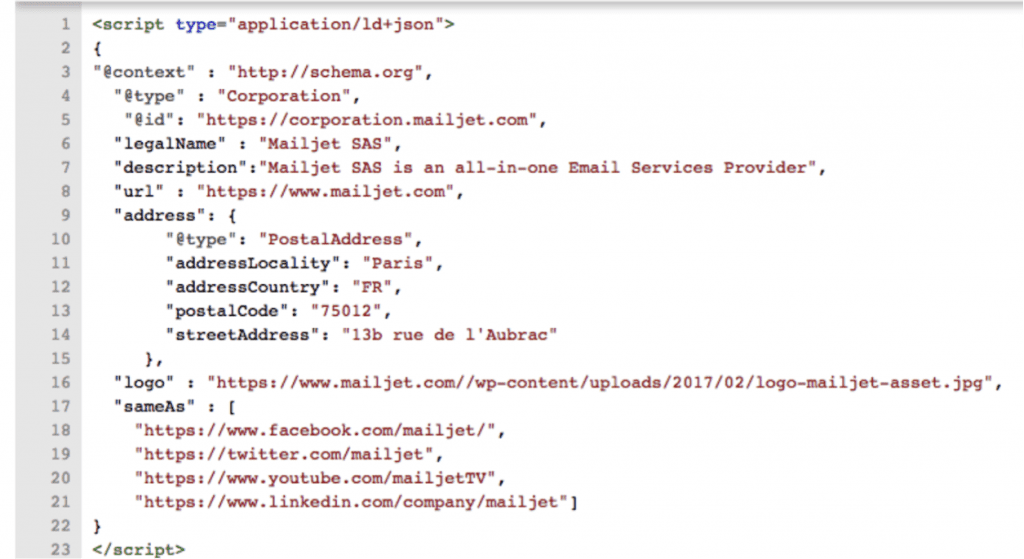
For full details of the properties you can use, plus some examples: https://schema.org/Corporation
Taking It To The Top – All Other Pages
For most other Schema, you won’t get rich snippets, but any markup that confirms the role of a page plays (contact, category etc.) and the important parts of the content they contain adds an explicit layer that helps Google organise your content in its index (and potentially display to its users) in the manner you want. Google has every reason to index and present your content in the way you prefer (assuming you are not distorting the truth). By being explicit and machine-digestible, this Schema gives it the means to do so.
An incredibly simple example is marking up your contact page…

Using Schema to describe every aspect of your business and your site gives you what Martha Van Berkel from Schemaapp.com calls “control points” over how Google understands, and ultimately presents your content. I am a VERY big fan of Martha’s approach.
Preciseness
To quote Bill Slawski “Schema is created by subject matter experts who understand the industry niches that they are creating structured data for; a Schema is based upon a potential database field relevant to the topic you are writing about. They potentially add preciseness to a page.”
I personally think we often have a tendency to forget, but being explicit is incredibly important in everything we do. Schema.org gives us a simple system that allows us to be explicit in a machine readable format. How cool is that ?
Job Postings
The new Job Posting markup gives great insight into how much control Schema can potentially give. At the time of writing it is actively used by Google in 26 Asian, European, Middle Eastern countries + all North America, all Latin America, all SS Africa and should extend to even more countries in 2019. Right now Google uses this data to directly feed Google Jobs.
Two things:
1) If Google is doing that, the step to other platforms doing the same is very small.
2) This is a rare case where Schema markup has a direct and immediate impact on search results. Get your Schema in place, secure your place in Google jobs… and more visibility on search results.
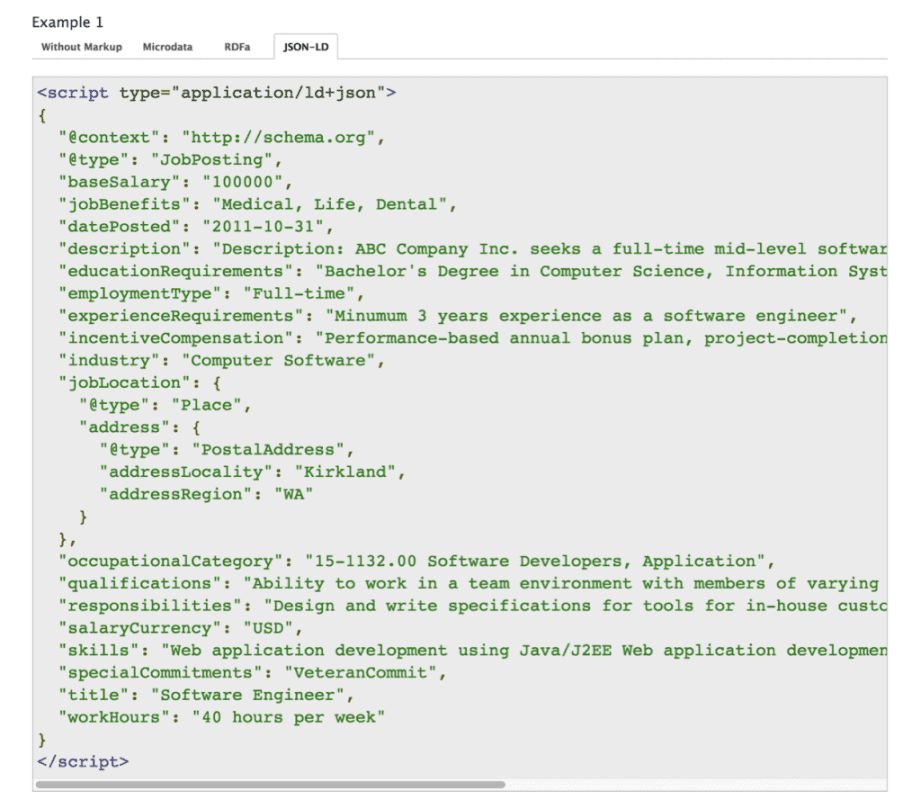
Looking at this example, it is easy to see how this structured data helps you (employer) empower / help Google to present accurate, relevant information to the the potential candidate in the manner you want.
Control
We often forget that we are attempting to convince Google to present our offer to its own clients. The users who come to us from Google are not ‘just’ users. They are Google’s clients.
So we must present our offers via the “Google prism”. The more we provide information in a structured manner that the prism is comfortable with, the more likely it is that the platform will present correct information and the message we want. Schema markup is the ideal way to present explicit, unambiguous information to Google so that it can present your message to its clients in the manner YOU choose… unfiltered.
Job Posting markup is a really great example of (and makes a great argument for) using the control point (thanks Martha 🙂 Schema offers
Midterm Wins – SEO + Featured Snippet + Speakable
SEO
Schema markup is not a ranking factor. Google has stated this very clearly several times. However that does not mean it does not affect rankings. It does affect rankings indirectly in several ways.
It increases the confidence Google has of its understanding of the content of the page. That means that, when faced with a choice of two pages that could answer the intent of the user query, it will tend to choose the one it is most confident fulfills the need. Schema can give a page the edge.
In the case where Schema markup adds rich elements to your SERP snippet, the click through rate will tend to rise. This is a clear signal to Google that the content is of interest to users for that query. Assuming users are satisfied by your offer, that they do not pogo-stick (i.e. bounce back to the SERP from your site and click through to another of the options), then over time Google will tend to prefer your content to the competition.
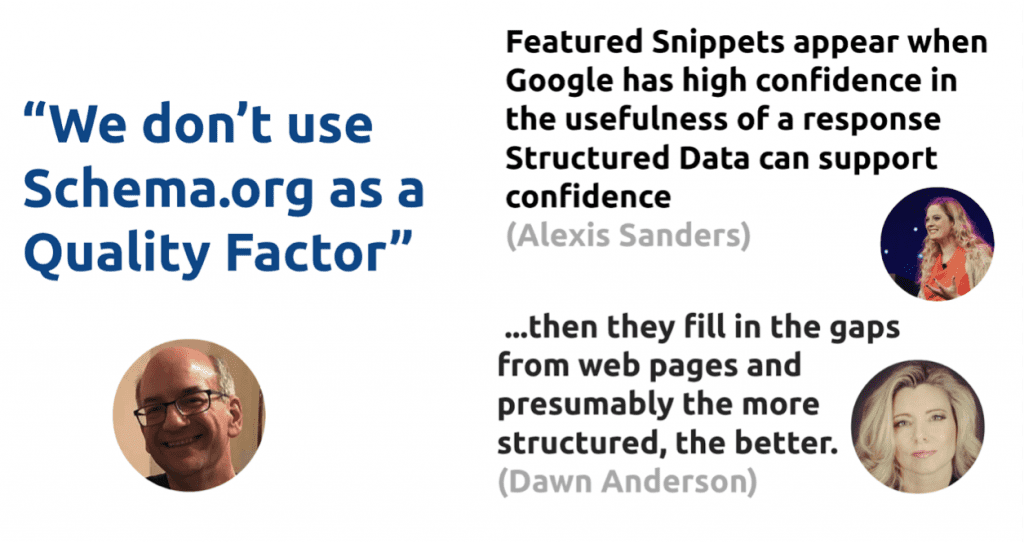
Important – I do not say that Schema directly improves rankings, or that it is a ranking factor, I do say that having it on your pages will tend to trigger signals that will have a positive effect on rankings.
Position0 / Featured Snippet
Schema markup is not necessary in order to get a featured snippet, but it is clear that it helps Google organise the single answers it wants to provide. Schema markup ensures that Google can format the response to the user query. Consider these:
Opinion
Credibility / opinion about your brand and your services is becoming more and more important. Be credible. Be the most liked in your industry. Very much traditional marketing. But Google is now the intermediary. If you want Google to offer you up as the best solution to a user query, you have no choice but to communicate explicitly with Google… and prove that you are the best. Schema markup offers many many ways to do that.
The obvious example is reviews…

But perhaps you can convince Google of your credibility using lesser-known markups alongside the most obvious ones?
Voice Search
Being position0 means you will probably be the spoken answer on Google Assistant. Schema markup will help with that since it provides an explicit confirmation of the structure and meaning of the content. So add Schema wherever you can simply to clarify.
One for 2019: Speakable Schema – an immense opportunity to be the answer provided by Google Assistant.
Actions And Skills
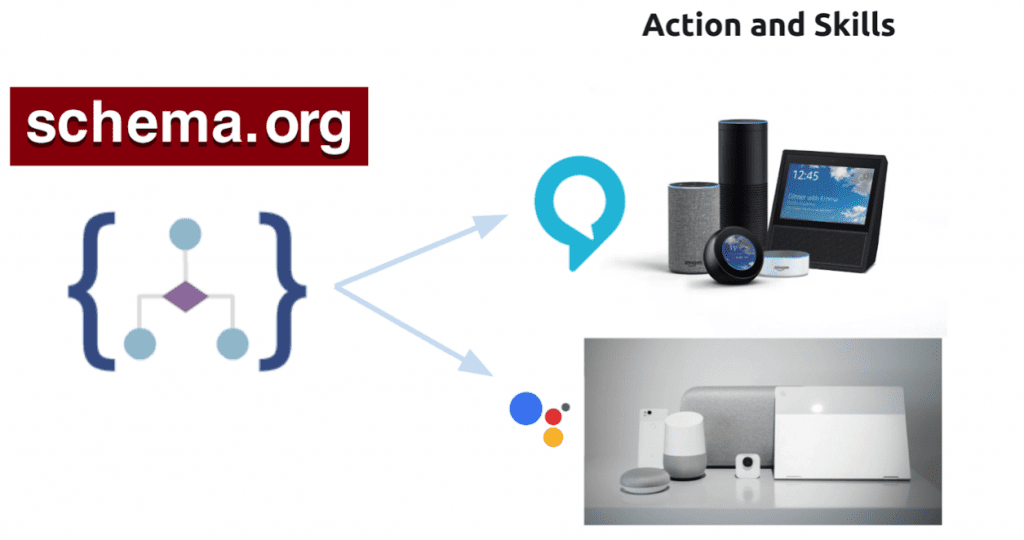
Actions (Google) and Skills (Amazon) are simply ways to bypass search and train your voice assistant. Personally, I suspect that Actions and Skills will end up like Apps – downloaded in vast quantities, then rarely used, uninstalled and forgotten for most publishers. Due to the slow take up of Actions and Skills, both Google and Amazon will increasingly leverage Schema markup to emulate Actions and Skills behaviour.
Tip: for brands that are not household names, implementing Schema correctly across your site to allow universal access to the various machines (Google, Amazon, Bing, Facebook etc) will be more effective than building and Action/Skill on a per vendor basis. Both medium and long term wins.
Long Term Benefits – AEO
The Knowledge Graph
What is a knowledge graph? Quick definition from Luciano Del Corro @lemborio:
“An Encyclopedia for machines. It consists of a formal description of certain knowledge that can be accessed and reasoned about by computers. As a book contains knowledge meant to be read by humans, a knowledge graph is specially formatted to be understood by computers.”
The Knowledge Graph is the key to the future of search. It allows Google to identify entities, attributes and relationships between them – giving it an understanding of the world. That understanding underpins how it interprets users queries (read: understands the question), how it interprets web content (read: understands the answer) and the confidence in the answers it finds (read: ranking the available answers).
And Schema markup is the key to that understanding. Start now, reap the rewards in the future. Ignore Schema today, and you will be in a game of catch-up that you will never win.
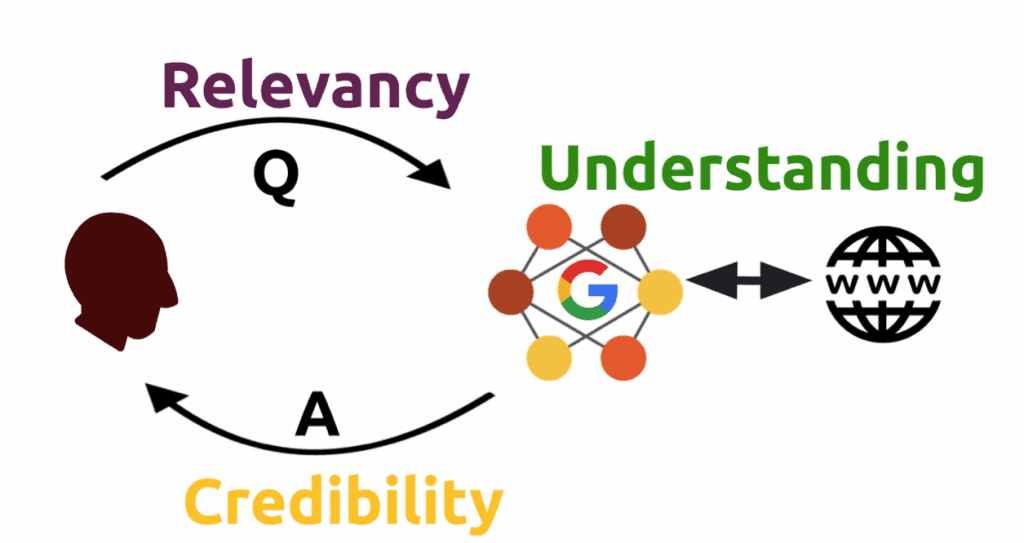
Schema is the basis of communicating who you are and what you offer to Google and that is a prerequisite to gaining a place in the Knowledge Graph anytime soon. Without Schema the possibility that you have a place in the Knowledge Graph is very low in the short and medium term. Longer term (5 or 10 years), it may happen, but don’t count on it since extracting facts from an unstructured web remains a major challenge. Put your Schema in place today !
But Google Says They Expect Schema Not To Be Needed
Looking a long way into the future, Google (plus Alexa, Microsoft and other machines that attempt to understand the world), will no longer need Schema markup. Google have been clear for several years that, with Machine Learning, they intend to reduce reliance on Schema markup.
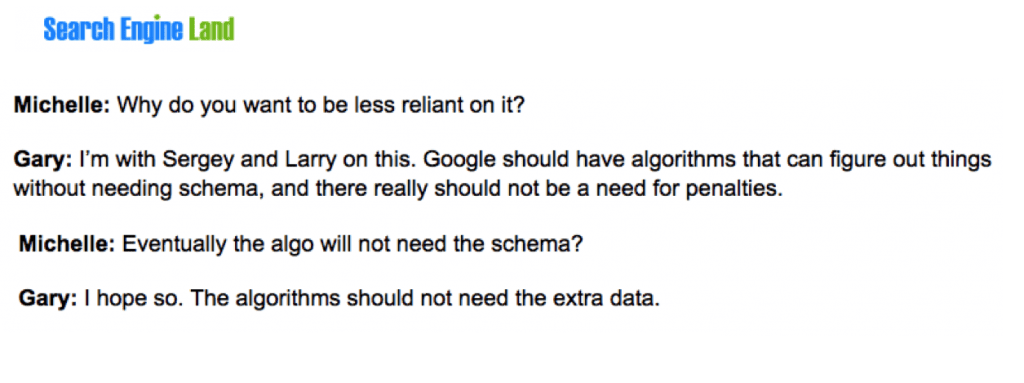
Keynote discussion at SMX Advanced search marketing conference, June 2018).
So is there a motivation for implementing now for the very long term? Yes.
This isn’t going to happen anytime soon. Five years. Maybe ten. Maybe more. Whatever the time frame, it is worth working on this now. In order to be able to achieve this goal Google needs a training set. Being part of that training set means that you will likely be a trusted source in the future. Exactly what benefits that may bestow remains to be seen, but logic dictates that having any kind of status as a trusted source for information has to positive.
Schema Today And Tomorrow
After reading this article, I am sure you are now 100% convinced that you need to use Schema markup at every opportunity.
It truly is a no-brainer. When the benefits are short, mid and long term it is foolish to say ‘no’.
Start today.

Bio:
Jason Barnard is an entrepreneur, writer and CEO of Kalicube, a digital marketing agency and groundbreaking software company based in France. Jason is also a digital marketer known as the “The Brand SERP Guy.” Jason’s first book, “The Fundamentals of Brand SERPs for Business,” was published in 2022.
You can reach him via LinkedIn or @jasonmbarnard
